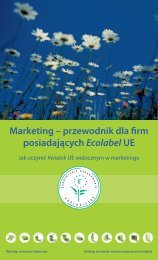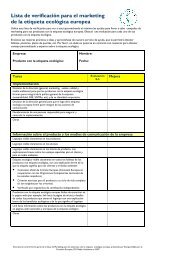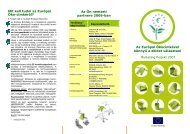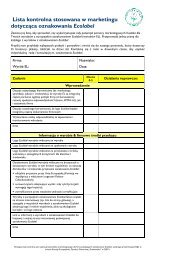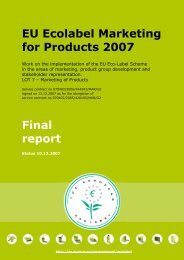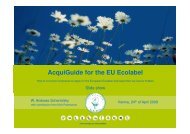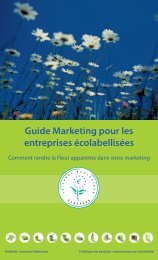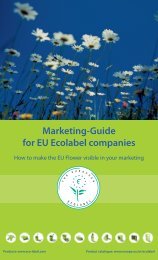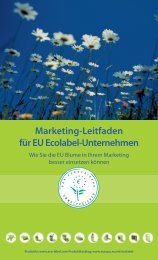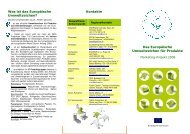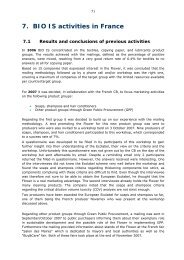Questionnaire for workshop participants - EU Ecolabel Marketing for ...
Questionnaire for workshop participants - EU Ecolabel Marketing for ...
Questionnaire for workshop participants - EU Ecolabel Marketing for ...
You also want an ePaper? Increase the reach of your titles
YUMPU automatically turns print PDFs into web optimized ePapers that Google loves.
5.14. Final report LUBRICANTs<br />
During 2007 the project team working on the promotion of the European <strong>Ecolabel</strong><br />
Lubricants consisted of Demi Theodori (until July 2007), Ckees van Oijen and Hildo Krop,<br />
senior researchers and consultants working at the department Chemical Risks of IVAM<br />
UvA BV, a consultancy bureau on sustainability.<br />
5.14.1. Project result 2006 and situation 2007<br />
In 2006 IVAM contacted eleven companies and provided them with extensive and tailor<br />
made advice on how to evaluate and/or re<strong>for</strong>mulate their products <strong>for</strong> application <strong>for</strong> the<br />
<strong>EU</strong> <strong>Ecolabel</strong> Lubricants.<br />
The communication strategy in 2006 included:<br />
a) Establishing contacts with individual lubricant suppliers<br />
b) Creating a lubricant folder, in<strong>for</strong>mation flyer and questionnaire<br />
c) Writing and sending press releases<br />
d) Presentation on Tribology Conference in Vienna, Green Chemistry Workshop in<br />
Mamaia, RO and ELGI conference in Prague<br />
e) Meeting with Dutch Ministry engineers and Blue Angel representatives<br />
f) Meeting with Greek CB<br />
Our overall conclusion <strong>for</strong> 2006 was that businesses and industry were aware of the<br />
existence of the European Eco-label Lubricants and interested in applying <strong>for</strong> the label<br />
but faced problems with <strong>for</strong>mulating suitable products due to 4 main reasons:<br />
a) the lack of data <strong>for</strong> ecotoxicological evaluation of their products,<br />
b) the necessity of developing new additives <strong>for</strong>mulations,<br />
c) th reluctance of component suppliers (base oil and additives suppliers) to disclose<br />
confidential in<strong>for</strong>mation about their products, and finally,<br />
d) the lack of manpower within lubricant suppliers due to the allocation of resources<br />
<strong>EU</strong>RO 4 and <strong>EU</strong>RO 5 (exhaust emissions from vehicles).<br />
Important results in 2006 can be summarized as follows. First, by the end of 2006 two of<br />
the products of the Finnish Binol and the French Novance were awarded with the <strong>EU</strong><br />
<strong>Ecolabel</strong>. Second, in 2006 the Austrian <strong>Ecolabel</strong> adopted the <strong>EU</strong> <strong>Ecolabel</strong> requirements<br />
and there was a law under preparation in France (Loi d'orientation agricole n°2006-11)<br />
<strong>for</strong> the mandatory use of lubricants with the <strong>EU</strong> <strong>Ecolabel</strong> in environmentally sensitive<br />
areas ("zones sensibles") from 1 January 2008 onwards. Moreover, a basis was created<br />
<strong>for</strong> the adoption of the <strong>EU</strong> <strong>Ecolabel</strong> in the Dutch policy concerning biolubricants.<br />
By April 2007 a third, German company was awarded with the <strong>EU</strong> <strong>Ecolabel</strong>: Kajo Chemie,<br />
shortly after, in July followed by a lubricant product of the Swiss brand Panolin, which<br />
brings the total (within 1,5 years time) to 12 products. Overall, it appears that the<br />
market is gradually increasing its ef<strong>for</strong>ts in the area of re<strong>for</strong>mulating existing products<br />
that can meet the <strong>EU</strong> <strong>Ecolabel</strong> requirements. In the Netherlands the Dutch Ministry of<br />
172



